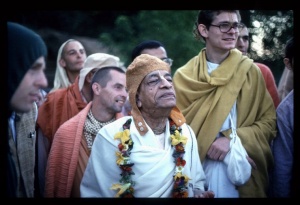SB 9.16.30: Difference between revisions
m (1 revision(s)) |
(Vanibot #0018 edit: make synonym terms in Sanskrit italic in SB - Vanisource) |
||
| Line 1: | Line 1: | ||
{{info | {{info | ||
|speaker= | |speaker=Śukadeva Gosvāmī | ||
|listener=King | |listener=King Parīkṣit | ||
}} | }} | ||
[[Category:Srimad-Bhagavatam - Canto 09 Chapter 16]] | |||
[[Category:Bhagavatam Verses Spoken by Sukadeva Gosvami - Vanisource|091630]] | |||
<div style="float:left">'''[[Srimad-Bhagavatam]] - [[SB 9|Ninth Canto]] - [[SB 9.16: Lord Parasurama Destroys the World's Ruling Class|Chapter 16: Lord Paraśurāma Destroys the World's Ruling Class]]'''</div> | |||
<div style="float:right">[[File:Go-previous.png|link=SB 9.16.29]] '''[[SB 9.16.29]] - [[SB 9.16.31]]''' [[File:Go-next.png|link=SB 9.16.31]]</div> | |||
{{RandomImage}} | |||
==== TEXT 30 ==== | ==== TEXT 30 ==== | ||
<div | <div class="verse"> | ||
putraṁ kṛtvā śunaḥśephaṁ | :putraṁ kṛtvā śunaḥśephaṁ | ||
devarātaṁ ca bhārgavam | :devarātaṁ ca bhārgavam | ||
ājīgartaṁ sutān āha | :ājīgartaṁ sutān āha | ||
jyeṣṭha eṣa prakalpyatām | :jyeṣṭha eṣa prakalpyatām | ||
</div> | </div> | ||
| Line 17: | Line 22: | ||
==== SYNONYMS ==== | ==== SYNONYMS ==== | ||
<div | <div class="synonyms"> | ||
''putram''—a son; ''kṛtvā''—accepting; ''śunaḥśepham''—whose name was Śunaḥśepha; ''devarātam''—Devarāta, whose life was saved by the demigods; ''ca''—also; ''bhārgavam''—born in the Bhṛgu dynasty; ''ājīgartam''—the son of Ajīgarta; ''sutān''—to his own sons; ''āha''—ordered; ''jyeṣṭhaḥ''—the eldest; ''eṣaḥ''—Śunaḥśepha; ''prakalpyatām''—accept as such. | |||
</div> | </div> | ||
| Line 24: | Line 29: | ||
==== TRANSLATION ==== | ==== TRANSLATION ==== | ||
<div | <div class="translation"> | ||
Viśvāmitra accepted the son of Ajīgarta known as Śunaḥśepha, who was born in the Bhṛgu dynasty and was also known as Devarāta, as one of his own sons. Viśvāmitra ordered his other sons to accept Śunaḥśepha as their eldest brother. | Viśvāmitra accepted the son of Ajīgarta known as Śunaḥśepha, who was born in the Bhṛgu dynasty and was also known as Devarāta, as one of his own sons. Viśvāmitra ordered his other sons to accept Śunaḥśepha as their eldest brother. | ||
</div> | </div> | ||
__NOTOC__ | |||
<div style="float:right; clear:both;">[[File:Go-previous.png|link=SB 9.16.29]] '''[[SB 9.16.29]] - [[SB 9.16.31]]''' [[File:Go-next.png|link=SB 9.16.31]]</div> | |||
__NOTOC__ | |||
__NOEDITSECTION__ | |||
Revision as of 10:04, 1 December 2017

His Divine Grace
A.C. Bhaktivedanta Swami Prabhupada
A.C. Bhaktivedanta Swami Prabhupada
TEXT 30
- putraṁ kṛtvā śunaḥśephaṁ
- devarātaṁ ca bhārgavam
- ājīgartaṁ sutān āha
- jyeṣṭha eṣa prakalpyatām
SYNONYMS
putram—a son; kṛtvā—accepting; śunaḥśepham—whose name was Śunaḥśepha; devarātam—Devarāta, whose life was saved by the demigods; ca—also; bhārgavam—born in the Bhṛgu dynasty; ājīgartam—the son of Ajīgarta; sutān—to his own sons; āha—ordered; jyeṣṭhaḥ—the eldest; eṣaḥ—Śunaḥśepha; prakalpyatām—accept as such.
TRANSLATION
Viśvāmitra accepted the son of Ajīgarta known as Śunaḥśepha, who was born in the Bhṛgu dynasty and was also known as Devarāta, as one of his own sons. Viśvāmitra ordered his other sons to accept Śunaḥśepha as their eldest brother.